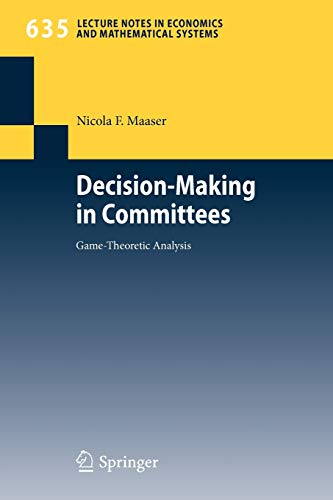Items related to Decision-Making in Committees: Game-Theoretic Analysis...
Decision-Making in Committees: Game-Theoretic Analysis (Lecture Notes in Economics and Mathematical Systems, 635) - Softcover

Synopsis
Political and economic institutions are typically governed by committees that face the challenge to reconcile the preferences of their members. How should decision rules be designed to generate fair and sustainable agreements, for example if committee members represent groups of different sizes? This book uses game-theoretic concepts and models to address the issue of political decision-making processes. In addition to providing a survey on basic game-theoretic tools in the analysis of political decisions, the author looks at specific issues such as two-tiered voting systems or the influence of lobbyists on legislative committees, and shows how the models can be applied to real-world contexts such as the EU decision-making institutions.
"synopsis" may belong to another edition of this title.
From the Back Cover
Political and economic institutions are typically governed by committees that face the challenge to reconcile the preferences of their members. How should decision rules be designed to generate fair and sustainable agreements, for example if committee members represent groups of different sizes? This book uses game-theoretic concepts and models to address the issue of political decision-making processes. In addition to providing a survey on basic game-theoretic tools in the analysis of political decisions, the author looks at specific issues such as two-tiered voting systems or the influence of lobbyists on legislative committees, and shows how the models can be applied to real-world contexts such as the EU decision-making institutions.
"About this title" may belong to another edition of this title.
US$ 117.37 shipping from Germany to U.S.A.
Destination, rates & speedsSearch results for Decision-Making in Committees: Game-Theoretic Analysis...
Decision-Making in Committees: Game-Theoretic Analysis (Lecture Notes in Economics and Mathematical Systems, 635)
Seller: Lucky's Textbooks, Dallas, TX, U.S.A.
Condition: New. Seller Inventory # ABLIING23Mar3113020214532
Quantity: Over 20 available
Decision-Making in Committees: Game-Theoretic Analysis (Lecture Notes in Economics and Mathematical Systems, 635)
Seller: Best Price, Torrance, CA, U.S.A.
Condition: New. SUPER FAST SHIPPING. Seller Inventory # 9783642041525
Quantity: 2 available
Decision-Making in Committees: Game-Theoretic Analysis (Lecture Notes in Economics and Mathematical Systems, 635)
Seller: California Books, Miami, FL, U.S.A.
Condition: New. Seller Inventory # I-9783642041525
Quantity: Over 20 available
Decision-Making in Committees: Game-Theoretic Analysis (Lecture Notes in Economics and Mathematical Systems, 635)
Seller: Ria Christie Collections, Uxbridge, United Kingdom
Condition: New. In. Seller Inventory # ria9783642041525_new
Quantity: Over 20 available
Decision-Making in Committees: Game-Theoretic Analysis (Lecture Notes in Economics and Mathematical Systems)
Seller: Chiron Media, Wallingford, United Kingdom
Paperback. Condition: New. Seller Inventory # 6666-IUK-9783642041525
Quantity: 10 available
Decision-Making in Committees
Seller: Books Puddle, New York, NY, U.S.A.
Condition: New. pp. 150. Seller Inventory # 261376127
Quantity: 4 available
Decision-Making in Committees
Seller: BuchWeltWeit Ludwig Meier e.K., Bergisch Gladbach, Germany
Taschenbuch. Condition: Neu. This item is printed on demand - it takes 3-4 days longer - Neuware -Political and economic institutions are typically governed by committees that face the challenge to reconcile the preferences of their members. How should decision rules be designed to generate fair and sustainable agreements, for example if committee members represent groups of different sizes This book uses game-theoretic concepts and models to address the issue of political decision-making processes. In addition to providing a survey on basic game-theoretic tools in the analysis of political decisions, the author looks at specific issues such as two-tiered voting systems or the influence of lobbyists on legislative committees, and shows how the models can be applied to real-world contexts such as the EU decision-making institutions. 126 pp. Englisch. Seller Inventory # 9783642041525
Quantity: 2 available
Decision-Making in Committees
Print on DemandSeller: Majestic Books, Hounslow, United Kingdom
Condition: New. Print on Demand pp. 150 49:B&W 6.14 x 9.21 in or 234 x 156 mm (Royal 8vo) Perfect Bound on White w/Gloss Lam. Seller Inventory # 6504608
Quantity: 4 available
Decision-Making in Committees
Print on DemandSeller: Biblios, Frankfurt am main, HESSE, Germany
Condition: New. PRINT ON DEMAND pp. 150. Seller Inventory # 181376117
Quantity: 4 available
Decision-making in Committees
Seller: moluna, Greven, Germany
Kartoniert / Broschiert. Condition: New. Dieser Artikel ist ein Print on Demand Artikel und wird nach Ihrer Bestellung fuer Sie gedruckt. Political and economic institutions are typically governed by committees that face the challenge to reconcile the preferences of their members. How should decision rules be designed to generate fair and sustainable agreements, for example if committee me. Seller Inventory # 5044219
Quantity: Over 20 available

